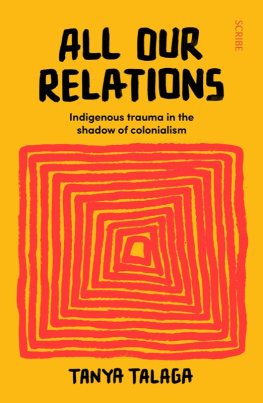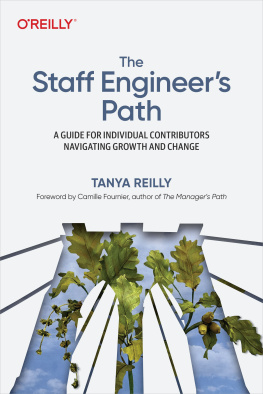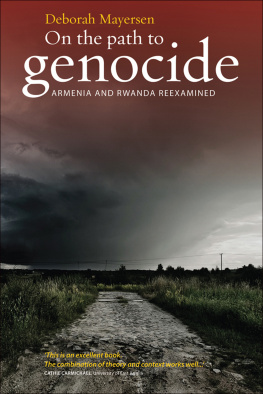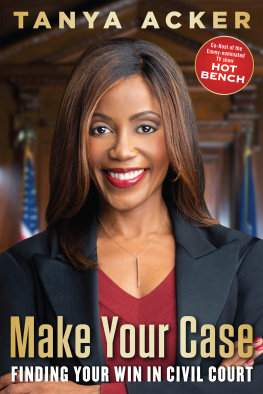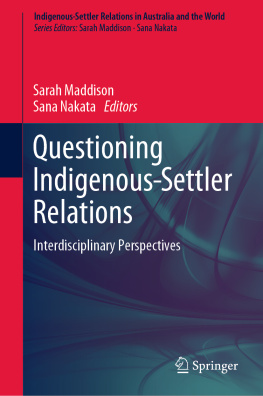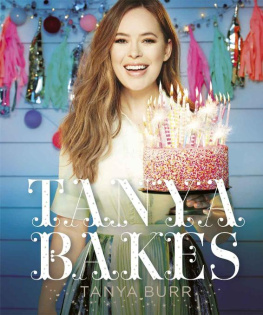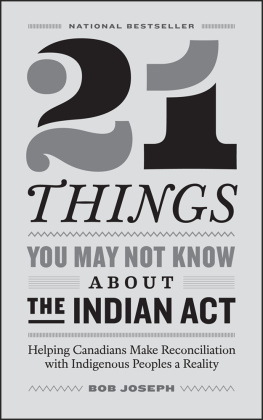TANYA TALAGA - ALL OUR RELATIONS : finding the path to healing after indigenous genocide.
Here you can read online TANYA TALAGA - ALL OUR RELATIONS : finding the path to healing after indigenous genocide. full text of the book (entire story) in english for free. Download pdf and epub, get meaning, cover and reviews about this ebook. City: Place of publication not identified, year: 2020, publisher: SCRIBE PUBLICATIONS, genre: Politics. Description of the work, (preface) as well as reviews are available. Best literature library LitArk.com created for fans of good reading and offers a wide selection of genres:
Romance novel
Science fiction
Adventure
Detective
Science
History
Home and family
Prose
Art
Politics
Computer
Non-fiction
Religion
Business
Children
Humor
Choose a favorite category and find really read worthwhile books. Enjoy immersion in the world of imagination, feel the emotions of the characters or learn something new for yourself, make an fascinating discovery.
- Book:ALL OUR RELATIONS : finding the path to healing after indigenous genocide.
- Author:
- Publisher:SCRIBE PUBLICATIONS
- Genre:
- Year:2020
- City:Place of publication not identified
- Rating:3 / 5
- Favourites:Add to favourites
- Your mark:
- 60
- 1
- 2
- 3
- 4
- 5
ALL OUR RELATIONS : finding the path to healing after indigenous genocide.: summary, description and annotation
We offer to read an annotation, description, summary or preface (depends on what the author of the book "ALL OUR RELATIONS : finding the path to healing after indigenous genocide." wrote himself). If you haven't found the necessary information about the book — write in the comments, we will try to find it.
TANYA TALAGA: author's other books
Who wrote ALL OUR RELATIONS : finding the path to healing after indigenous genocide.? Find out the surname, the name of the author of the book and a list of all author's works by series.
ALL OUR RELATIONS : finding the path to healing after indigenous genocide. — read online for free the complete book (whole text) full work
Below is the text of the book, divided by pages. System saving the place of the last page read, allows you to conveniently read the book "ALL OUR RELATIONS : finding the path to healing after indigenous genocide." online for free, without having to search again every time where you left off. Put a bookmark, and you can go to the page where you finished reading at any time.
Font size:
Interval:
Bookmark:

ALL OUR RELATIONS
Tanya Talaga is the acclaimed author of Seven Fallen Feathers , a multi-award winner including the RBC Taylor Prize, the Shaughnessy Cohen Prize for Political Writing, and the First Nation Communities READ: Young Adult/Adult Award. The book was a finalist for the Hilary Weston Writers Trust Nonfiction Prize and the BC National Award for Nonfiction. Talaga was the 2018 CBC Massey Lecturer, and is the author of the US bestseller All Our Relations . For more than twenty years she has been a journalist at the Toronto Star . Talaga is of Polish and Ojibwe descent. Her grandmother is a member of Fort William First Nation. She lives in Toronto with her two teenage children.
Scribe Publications
2 John St, Clerkenwell, London, WC1N 2ES, United Kingdom
1820 Edward St, Brunswick, Victoria 3056, Australia
Published by arrangement with House of Anansi Press, Toronto, Canada.
Published by Scribe 2020
Copyright Tanya Talaga and the Canadian Broadcasting Corporation 2018
This book was originally published in Canada as part of the Massey Lectures Series, co-sponsored by the Canadian Broadcasting Corporation, Massey College in the University of Toronto, and House of Anansi Press. The series was created in honour of the Right Honourable Vincent Massey, former governor-general of Canada, and was inaugurated in 1961 to provide a forum for radio where major contemporary thinkers could address important issues of our time.
All rights reserved. Without limiting the rights under copyright reserved above, no part of this publication may be reproduced, stored in or introduced into a retrieval system, or transmitted, in any form or by any means (electronic, mechanical, photocopying, recording or otherwise) without the prior written permission of the publishers of this book.
The moral right of the author has been asserted.
9781912854530 (UK edition)
9781925849547 (Australian edition)
9781925693942 (ebook)
Catalogue records for this book are available from the National Library of Australia and the British Library.
scribepublications.co.uk
scribepublications.com.au
For my sister, nimisenh ,
Donna Warren
(19602015)
CONTENTS
Chapter One:
Chapter Two:
Chapter Three:
Chapter Four:
Chapter Five:
To the person who is struggling at this moment:
We can choose to continue to think of ourselves as victims and always look to justify our own fears and inadequacies and our own failings by blaming colonialism, or residential schools, or government paternalism, or other realities of our past.
We can also decide, if we choose to do so, that this is a way of thinking that is no longer useful for us as we look to the future.
These factors were certainly part of our past, but it is a past which we have struggled to overcome, and the reality is that we have overcome them.
It is no longer useful for us as individuals, as communities, and ultimately as a Nation to remain stuck in a way of thinking which does not reflect the possibilities for the future.
Matthew Coon Come
Grand Chief, Grand Council of the Crees
(19871999, 20092017)
The Peoples Inquiry , Mushkegowuk Council, 2016
But dont say in the years to come that you would have lived your life differently if only you had heard this story.
Youve heard it now.
Thomas King
The Truth About Stories: A Native Narrative
CBC Massey Lectures, 2003
ONE
WE WERE ALWAYS HERE
IN THE SPRING OF 2017, I was driving down May Street in Thunder Bay, Ontario, with Ricki Strang. We had just gone on an emotional walk along the McIntyre River, which weaves around a strip mall, past a parking lot, and underneath an overpass. We were remembering his younger brother Reggie, whose body was found in the water there on November 1, 2007. Reggie was one of seven First Nations students who died while attending high school in Thunder Bay between 2000 and 2011. Ricki was only sixteen when he woke up in the river on October 26, 2007, the last night he saw his fifteen-year-old brother alive. Ricki mentioned that he had to leave the next day so he could attend a memorial service for Amy Owen, a girl back home in Poplar Hill First Nation, a remote fly-in reserve more than six hundred kilometres northwest of Thunder Bay. He quietly told me that she was really young and that she had died by suicide.
On the evening of January 8, 2017, Amy Owen ran out of her Ottawa-area group home and headed straight for the train tracks across the street. This was where the thirteen-year-old planned to die. The head of the Beacon Home remembers that in the evenings, Amy would talk about how she needed to do it. She wrote it on the walls, on pieces of paper. I need out of here was one message. I want to die was another. The night that Amy ran, staff at the seven-bed facility for teenage girls were ready and right behind her. Amy would not be successful that day.
One of Amys closest friends would be: that same night, more than one thousand kilometres away, in the remote Northern Ontario fly-in First Nations community of Wapekeka, twelve-year-old Jolynn Winter took her own life.
Two days later, on January 10, also in Wapekeka, Sandra Fox stepped out briefly to get pain relievers for the persistent discomfort in her leg. When she came home, she found that her daughter, Chantell Fox, also twelve years old and Jolynns best friend, had hanged herself.
Amy would follow suit, but not for another three months.
Seven girls in all, whose lives had intersected back home or in group homes or care facilities far away from their First Nations communities, took their lives within a year of one another.
Alayna Moose, twelve. Kanina Sue Turtle, fifteen. Jolynn Winter, twelve. Chantell Fox, twelve. Amy Owen, thirteen. Jenera Roundsky, twelve. Jeannie Grace Brown, thirteen.
Far beyond the dense, brightly lit skyscrapers and condominiums in the cities that ring the Great Lakes of southern Ontario, the people of Nishnawbe Aski Nation ( NAN ), a political organization comprising forty-nine First Nations spread out over the northern two-thirds of the province, have been trying to stop their children from dying.
The seven girls were from Poplar Hill First Nation and Wapekeka First Nation, both communities with populations of less than five hundred people. The anguish over the loss of the girls blankets NAN territory, covering the land east from the Manitoba border to James Bay, and then north to the shallow shores of Hudson Bay. The deaths of Jolynn and Chantell granddaughter of Wapekekas chief, Brennan Sainnawap hit the community so hard that nearly all the teenagers living there were put on suicide watch. Counsellors and mental health experts from the cities were flown in, and distraught children were sent on medical flights to be assessed by psychiatrists and doctors in southern hospitals, far away from home. The sadness overwhelmed the tiny, tight-knit community.
Some people have called the deaths of the seven girls a suicide pact, implying that the action was designed and formulated as a grand plan. Anna Betty Achneepineskum, former deputy grand chief of NAN , bristles at that term. She sees things differently. It was not a pact; that word covers up the root of the problem what the girls were experiencing was tremendous grief, and as a result they were struggling to cope.
Kids dont talk about suicide or talk about a pact for no reason, says Anna Betty. They are talking to each other about their trauma. And in a small community, you just cant isolate yourself from trauma.
It did not have to be this way. In the early summer of 2017, six months before his granddaughters death, Chief Sainnawap sent a note to Health Canada, the federal bureaucracy in charge of health funding for all the Indigenous people in the country, begging for assistance. The community leaders had discovered that some of their youth had made a suicide pact. The leaders were seeking $ 376,706 to immediately hire a mental health team of four workers who could deliver prevention and intervention programs and help create a healthy community environment. The request was denied. When the girls deaths made national and international news, the community later heard through the Canadian Broadcasting Corporation that Wapekekas request had come at an awkward time during the budgetary cycle there simply wasnt any funding available.
Next pageFont size:
Interval:
Bookmark:
Similar books «ALL OUR RELATIONS : finding the path to healing after indigenous genocide.»
Look at similar books to ALL OUR RELATIONS : finding the path to healing after indigenous genocide.. We have selected literature similar in name and meaning in the hope of providing readers with more options to find new, interesting, not yet read works.
Discussion, reviews of the book ALL OUR RELATIONS : finding the path to healing after indigenous genocide. and just readers' own opinions. Leave your comments, write what you think about the work, its meaning or the main characters. Specify what exactly you liked and what you didn't like, and why you think so.

